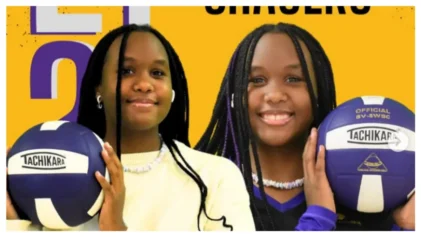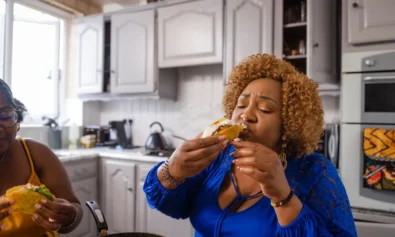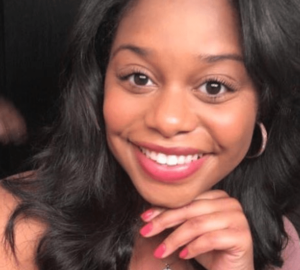
Nyla Smith. Image via Instagram.
The lives of disabled students can be difficult and stressful, because balancing treatment and education is no easy task. In some cases, schools are unaccommodating and peers can be mean-spirited.
Nyla Smith, a 20-year-old motivational speaker and advocate for disabled students, has taken the lessons she has learned from battling severe depression, anxiety disorder, inflammatory bowel disease and Crohn’s disease to help others in need.
The Dallas, Texas, native spoke to Atlanta Black Star about her incredible journey and her non-profit, The Hustle Hard Campaign, in an exclusive interview.
Crohn’s disease comes from inflammation in the lining of the digestive tract, which can lead to abdominal pain, extreme diarrhea, fatigue, weight loss and severe malnutrition. Smith’s battle with the disease did not stop her from achieving great things, however.
For two years, the young woman has been in remission and has gone on to make history at New York City’s St. John’s University by becoming the youngest graduate — at age 19 — to receive a Bachelor of Science degree in Environmental Science. She achieved this all while undergoing Remicade Infusions, which is a form of chemotherapy and drug administered through an IV to treat Crohn’s.
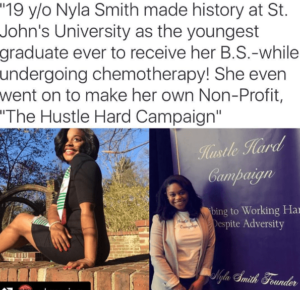
Image via Instagram.
Her story of triumph and resiliency has resonated with thousands over Instagram. Smith’s “Invisible Illness Challenge” allowed others to share their stories.
With spirited determination, she has sparked a community among those who suffer from invisible illnesses. She has essentially become a “big sister,” guiding those who seek her counsel.
The Beginning of a Momentous Journey
At age 14, Smith was diagnosed with depression before learning that she had Crohn’s.
Her severe depression was caused by a rocky transition from middle school to high school, she said. And being an average student and not excelling in math and science also contributed to her depression, she said.
As a young student, the diagnosis and constant bullying from peers was a hellacious experience that would impact her forever.
“I experienced a lot of bullying from different peers who felt like I was a distraction to my class for being ill,” she recalled. ” [I] don’t want to blame it on adolescence or not having any prior experience with people dealing with chemotherapy and being disabled, [but] they weren’t sure how to handle that or how to form an opinion about it.”
Plus, her school wasn’t very accommodating, she said.
“My teachers were easily frustrated,” she explained. “They went to my counselors, who got advice from my doctors, to basically advise me to discontinue school, take time off, [start back] at a later date as my health stabilized. I was so hurt when that happened.”
This was the lowest point in her young life. The depression manifested in the form of self harming.
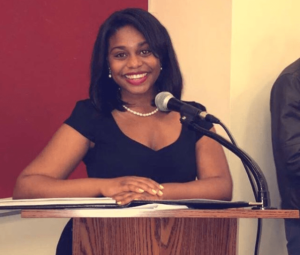
Image via Instagram.
“It was traumatic … my counselors had zero faith in me. I actually began cutting myself – self harming. That is something I often don’t talk about. It was a really bad time and I attempted suicide,” she said.
Smith said her parents kept her out of a mental institution and preferred to treat her at home.
“I was always feeling like my biggest enemy was myself. The person killing me the most was trapped inside of me. God wanted me to go through this to inspire other people and open people’s eyes to the truth about being a disabled student.”
From Trials and Tribulations to Hustling Hard
In Spring 2013, Smith participated in a dual enrollment program at Richland Collegiate High School in Richardson, Texas. She started late but earned an associate’s degree and moved to New York City to attend St. John’s.
This move was a drastic change for the young scholar. Dealing with Crohn’s disease, navigating one of the biggest cities on Earth, and staying on top of her studies was a monumental challenge.
Plus, old issues began to resurface.
“My college professors were actually incredibly difficult to work with,” Smith said. “Often times, because my illness is not one that is easy to detect, my professors would question me on whether or not I was faking my symptoms to get a pass in my classes.”
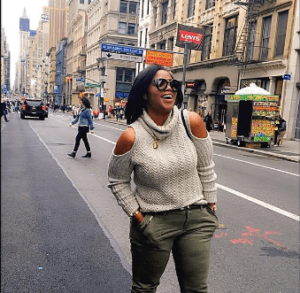
Image via Instagram.
She said her college peers were just as mean and nasty as high school students. According to her, the professors created an environment where bullying was commonplace and tolerated.
However, she persevered. She joined several organizations, including the pan-African student organization and tutored others multiple times a week.
Even with all of the negativity, she graduated at 19.
Don’t Mess With Texas
Around August of last year, Smith created The Hustle Hard Campaign, a non-profit that provides scholarships and resources for academically driven, severely ill students. She said, it “focuses on bringing awareness to the struggles of those both mentally and physically disabled within the educational system.”
After her sister invited her to an alternative school to speak about the campaign, she wanted more.
“Males and females were crying and embracing me,” Smith recalled.
She went on to mentor those kids.
Through the Hustle Hard Campaign, she hopes to award four disabled students who have been active in their communities with $500 scholarships, to be used for medical treatment and college expenses.
So far, she has raised money for the scholarships through speaking engagements and workshops. She is currently looking for partners and donations to give these students even more financial assistance.
Many of the students involved in the campaign are juniors and seniors in high school and freshmen in college. To qualify for the scholarships, students must be pursuing a bachelor’s degree.
In just a few months, she has met a wide variety of students with severe invisible illnesses. Some students have lost their sight, some are also dealing with Crohn’s, and others are constantly in surgery.
“I have so many people who have reached out. I’m emotional telling you about it because I know how hard it is for me to share my story. For these people to be so brave to reach out to somebody that they don’t even know, just to share what it is like for us in the classroom, I am so thankful.”
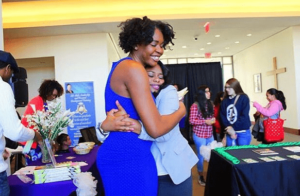
Image via Instagram
Some of her mentees were encouraged to drop out of school because of the severity of their illnesses, she said. One student reached out to Smith after considering suicide. She said the young woman was bullied because of her illness. Students made fun of her hair loss from chemotherapy and she felt suicide was the only way out.
“I know what that’s like, and I know what it feels to be so abandoned by your own body,” Smith shared.
Last week, Smith spoke with the Department of Youth and Fitness within the Dallas mayor’s office to see how she could help disabled students on campuses in her city. She said they advised her to reach as many students as possible by contacting administrators at each school and requesting that The Hustle Hard Campaign be present on campus.
“Then those students have to follow up with me after they put in a good word with their school’s administration,” Smith said. “I need young hustlers who feel connected with what I am doing and the club’s mission to provide a safe haven for [disabled] students to help execute the club’s charter.”
Smith also created a charitable basketball tournament — the first annual Hustle Hard basketball tournament — to help get $2,000 in donations for scholarships. Students will compete for a trophy to show that they are just as capable as anyone else. The tournament will be held in Dallas in August. She is currently looking for sponsors for the tournament.
Smith is definitely making her mark on the world. In addition to the many projects she has going on, she wants to create one more online initiative called “College and Crohn’s.”
This initiative will allow students with the disease to connect with others and to share their stories. The idea is to show that it is possible to have your own apartment, go to college, and be independent, despite the extreme circumstances of the disease.
